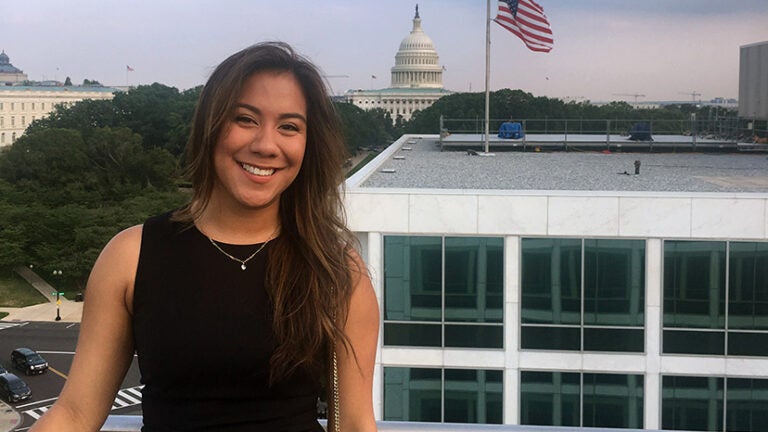
Rangel fellowship offers alumna hands-on (and around-the-world) training
Growing up in a small, rural town in Northern California, Carolina Cortez found herself missing the community and culture she remembered from her early childhood in Imperial County, one of the two counties along the California-Mexico border.
“Imperial County has a prominent Latino community. I lived there until I was 6, and then we moved to Northern California, where it was the complete opposite,” she says.
But now, as a graduate of the School of International Relations at the USC Dornsife College of Letters, Arts and Sciences, and a new fellow in the Rangel Graduate Fellowship Program, Cortez is looking toward a future in international relations that draws on both her American and Mexican heritage. She hopes that the Rangel Fellowship, a five-year program that prepares young people enrolled in graduate school for a career in the Foreign Service branch of the U.S. State Department, will help her work toward her goal of becoming a diplomat to a country — any country — in Latin America.
“That position would honor both aspects of who I am — my culture and background, but also my being American and all the opportunities I have had, being here and studying here. I want to give back to the community my parents grew up with,” she says.
Mexican roots
Both of Cortez’s parents are from Mexico, and the family visited there regularly for holidays and summer vacations. But it wasn’t until she attended college that she got the opportunity to live once more in a place with a large Latin American population.
“I didn’t really realize how much I had been missing my roots until I had the opportunity to go to USC, where I was surrounded by Latino communities and I was attending class with Latino kids my age. It was astonishing,” she says.
As a first-generation college student, she found the college search and application processes “overwhelming,” but she chose USC Dornsife because she fell in love with the campus and because it offered something for everyone. “I like that whoever you are, you can always find your niche,” she says.
Cortez credits Carol Wise, professor of political science and international relations, with helping her find her own niche, in the School of International Relations. “She has been a tremendous source of support for me,” Cortez says. “She studied something similar in her time, and I found my interest and my path became clearer on what I wanted to do professionally because of some of the classes I took with her.”
Preparing for diplomacy
Before graduating with a bachelor’s degree in international relations in 2018, Cortez completed a USC Dornsife study abroad program in Bilbao, Spain, and an internship in U.S. Rep. Nora Torres’s office, which was facilitated through the Congressional Hispanic Caucus Institute. She says she loved the cultural richness of Spain, particularly the region’s Basque influences. As an intern in Washington, she gained exposure to the workings of federal government, the process of crafting legislation and the experience of meeting with advocacy groups.
All of these aspects of the internship helped her land her first job, in then-Sen. Kamala Harris’s office, where she worked for a year before being accepted into the Congress-Bundestag Youth Exchange for Young Professionals program, which is jointly sponsored by the German parliament and the U.S. State Department.
Fellows in the program attend German language classes, take classes at German universities and perform internships in their career field. In Cortez’s case, she worked for the investment bureau for the German Ministry of Economics, Labor and Health in the state of Mecklenburg-Vorpommern. Unfortunately, due to the COVID-19 pandemic, Cortez’s internship was cut short, and she had to return to the United States in March 2020. But she was left with the lasting desire to specialize in the field of international economic investment.
Since returning, Cortez has spent her time volunteering with a nongovernmental organization in Mexico and applying to graduate schools. She is eager to start the fellowship program, not only for its opportunities to work at embassies and consulates abroad, but for the chance to bond with other people of color looking to work in international relations.
“The Rangel program is geared towards underrepresented communities, so a lot of the mentors we will have this summer and throughout the next few years are usually foreign service officers who are of a minority background,” she says. “I’m looking forward to having that support system.”
The Rangel Fellowship will start in May with an internship with the House Foreign Affairs Subcommittee on Western Hemisphere, Civilian Security, Migration and International Economic Policy.